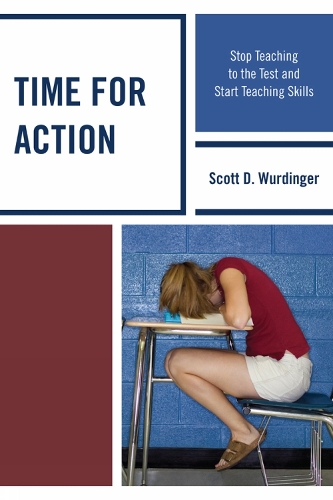
Time for Action: Stop Teaching to the Test and Start Teaching Skills
(Paperback)
Publishing Details
Time for Action: Stop Teaching to the Test and Start Teaching Skills
By (Author) Scott D. Wurdinger
Bloomsbury Publishing PLC
Rowman & Littlefield Education
30th November 2011
United States
Classifications
Professional and Scholarly
Non Fiction
Education / Educational sciences / Pedagogy
Educational strategies and policy
Teaching skills and techniques
371.260973
Physical Properties
Paperback
120
Width 155mm, Height 232mm, Spine 7mm
200g
Description
This book should be read by anyone concerned about the future of education in the United States. It was written for students, parents, educators, administrators, and policy makers because it will require effort from all these individuals to create meaningful change in the education system. This book discusses why the education system needs to change now, and provides practical examples of teaching approaches, school models, and assessment systems that can move the education system forward in the right direction. Students deserve an education that teaches them how to solve challenging problems and inspires them to become life long learners. Read this book and then go out and implement these ideas.
Reviews
Wurdinger (Minnesota State Univ.) offers an accessible, commonsense alternative to teaching to the test. His central tenet is simple: students learn the most and at the highest level when they are actively engaged in their own learning. Wurdinger offers an entire chapter on preparing teachers to use hands-on, skills-focused learning through projects, activities, and field experiences. While his arguments are hardly new, Wurdinger offers readers a refreshing antidote to the sterile, creativity-starved 'education reform' texts now on the market. Wurdinger believes that assessment of students should be based on their demonstration of what they have learned, and by demonstrate he does not mean through narrow, paper-and-pencil tests that tend to fixate on the memorization of disconnected and decontextualized facts. Instead, students demonstrate what they have learnedwhether it is academic knowledge, or a technical or life skill such as time managementthrough practice and products. The book is best suited for lay audiences....It is highly recommended for general collections and undergraduate education programs. Summing Up: Highly recommended. * Choice Reviews *
Scott Wurdinger has written a compelling booka very worthwhile read for both policy makers and practitioners. -- Tony Wagner, co-director, Change Leadership Group, Harvard University Graduate School of Education
Scott Wurdinger's new book hits the proverbial nail on the head. His thoughtful work on testing, disengagement and modern 'schooling' doesn't just re-state the problem but has practiced and proven solutions. He researches examples and ideas that work and he gives us hope by showing us that some of the solutions are already here. His experiential education background (wisdom really) lends well to a changing time that even the most canned curriculum and tightest content standards can't hold back. Innovation is in the air and Wurdinger gives us a peek at what's to come. Read this book and then have a conversation with someone who can really make a difference in a policy, in a school, in a classroom or a community. -- Doug Thomas, Executive Director EdVisions Schools
Dr. Wurdinger's book provides a passionate look at why we must significantly expand our NCLB driven definition of achievement. He correctly argues that achievement is much more than what standardized tests are addressing. He points out that what is more problematic is the iron grip the tests have on curriculum and instruction and the implications this has on student learning in the 21st century. -- Robert J. Wedl, former Minnesota Commissioner of Education
This is a polemic in the best sense of that word. Scott Wurdinger has produced a book full of compelling arguments against the current 'teach to the test' mentality. Accessible and entertaining it is sure to provoke energetic debate. -- Stephen Brookfield, John Ireland Endowed Chair, University of St. Thomas, Minneapolis-St. Paul
Author Bio
Scott Wurdinger is a professor of experiential education and leadership studies at Minnesota State University in Mankato, Minnesota. He has taught all age students in traditional and nontraditional settings and has been teaching in higher education for the past twenty-two years. He serves as a cadre expert for Innovative Quality Schools and is a board member for EdVisions, Inc., which is an organization that replicates project-based charter schools around the country.
